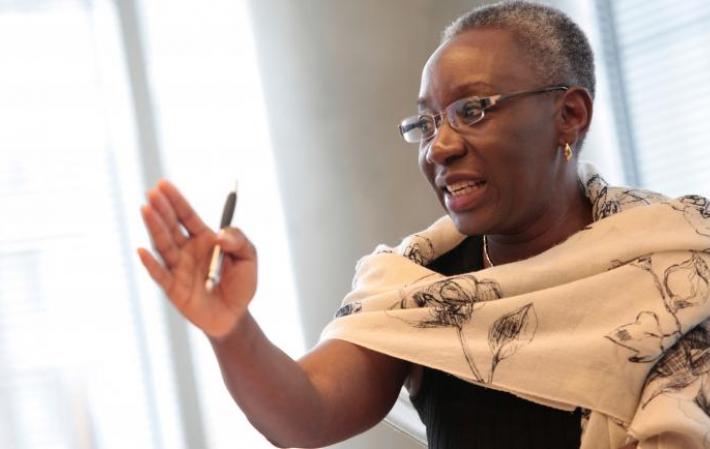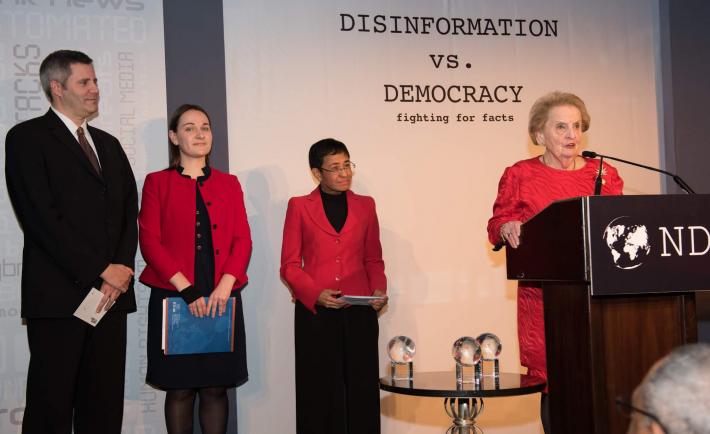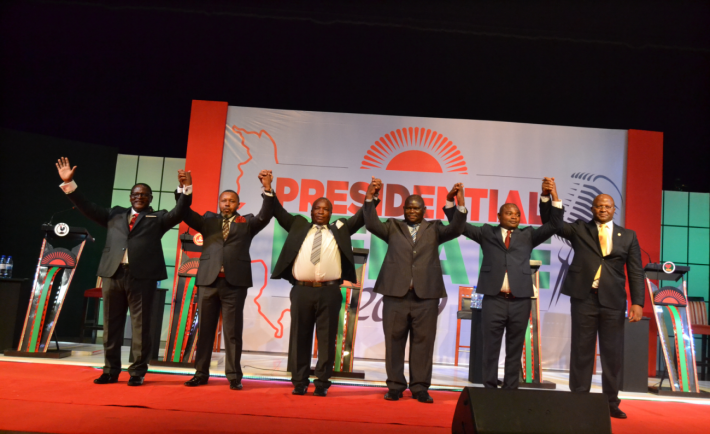
Sandra Pepera, Senior Associate and Director for NDI's Gender, Women and Democracy team.
For NDI President Derek Mitchell, observing the Tiananmen Square demonstrations in person 30 years ago was a turning point in his life. There was never a question that – in that moment, at that time, in that place – he was witnessing something historic, a revolution in action.
Looking back at the footage he captured with his video camera, Derek reflects on the students, and the spirit, of Tiananmen.
In this second episode of the DemWorks podcast, Ivanna Klympush-Tsintsadze, the deputy prime minister for European and Euro-Atlantic integration in Ukraine, talks to NDI President Derek Mitchell about her decision to run for parliament in the wake of the Ukrainian revolution, confrontations with misogyny early in her career, and her fight to open up the Ukrainian military to female service members.

NDI 2017 Democracy Award recipients with (right to left) Secretary Madeleine Albright, Maria Ressa (Rappler), Margo Gontar (StopFake.org), Dr. Phil Howard (Oxford Internet Institute). Photo credit: Margot Schulman
Celebrating “women risk takers,” this video focuses on #DemocracyHero Maria Ressa, a veteran journalist and the CEO of Rappler, the leading independent online news network in the Philippines that has been at the forefront of combating disinformation and exposing human rights abuses under the administration of Philippine President Rodrigo Duterte. For their critical reporting, Maria and her fellow independent journalists have been indicted multiple times on questionable charges. Maria herself has been arrested twice. Maria’s courage has been globally recognized. Among many accolades, she is a recipient of NDI’s Democracy Award in 2017, and TIME magazine’s Person of the Year award in 2018.
In the inaugural DemWorks podcast, I talk to the incomparable Madeleine K. Albright about her role as a risk-taking woman leader, the state of democracy and her role as chairman of NDI from its founding in 1983.
NDI and ASEAN Parliamentarians for Human Rights (APHR), a regional human rights advocacy organization, partnered to provide parliamentarians in Southeast Asia with the resources and networks to raise awareness and share best practices on religious freedom issues in the region.

Six of eight candidates running for President in Malawi participated in the third presidential debate organized by the Presidential Debates Taskforce. NDI Malawi supported all three debates, which were live streamed on Facebook. (l-r) Lazarus Chakwera, Malawi Congress Party; Saulos Chilima, UTM; John Chisi, Umodzi Party; Reverent Kaliya, Independent; Peter Kuwani, Mbakuwaku Movement for Development; and Atupele Muluzi, United Democratic Front.
During the Malawi 2019 presidential campaign season, NDI played a key role in assembling a broad taskforce to organize, produce and broadcast a series of debates with presidential aspirants. This was only the second time since multi-party elections were first held in 1994 that candidates for Malawi’s highest office gathered on stage before a live studio and broadcast audience.
As Yemen’s tragic war – fueled by a regional rivalry between the Kingdom of Saudi Arabia and the United Arab Emirates on one side and Iran on the other – drags on, the antagonists in the conflict have been stubbornly resistant to the efforts of U.N. negotiators to broker compromise and unwilling to make the first major steps toward peace. Yet, there is a curious and slightly hopeful political soap opera playing out in plain sight. The internationally recognized government of Abd Rabo Mansur Hadi and the Houthi rebels (also known by their formal name, Ansar Allah) are pursuing separate but concurrent strategies to increase their international legitimacy by reinvigorating Yemen’s parliament. Ansar Allah has also released a groundbreaking policy document that may show signs of a new appreciation for democratic processes. By seeking to achieve a legal quorum in parliament and drafting a series of policy proposals that could be used by the public to hold their regime accountable, the Houthis are demonstrating a surprising affinity to some of the forms of democracy. Their commitment to the substance of democracy is yet to be proven.
The Roma, whose numbers are estimated at more than 10 million, make up Europe’s largest minority group, and are also the largest socially and economically-marginalized population. Across the continent, Roma face systemic discrimination in employment, education, healthcare and housing. This leads to poor quality of life, lower life spans, higher school delinquency rates and higher unemployment rates in comparison to their fellow non-Roma citizens. According to official EU statistics, anywhere from 33 to 58 percent of Roma children will experience segregation in public schools and, on average, only 12 percent of Roma between the ages of 18 and 24 will have completed high school.
Online disinformation and computational propaganda can have major effects, particularly in volatile political environments where public opinion can be shifted to a narrative pushed by a group with access to personal data from target populations. The power of online systems to shift elections or referenda is the lesson of many recent political campaigns in history. That reality has shown the importance of strong institutions, laws that are capable of shifting with ongoing technological and political innovation, and better corporate governance.
“What is the local issue most important to you?”
“What is the national issue most important to you?”
“What qualities are you looking for in your member of parliament?”